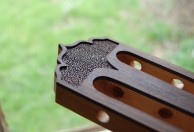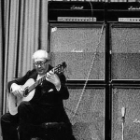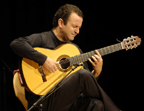Welcome to one of the most active flamenco sites on the Internet. Guests can read most posts but if you want to participate click here to register.
This site is dedicated to the memory of Paco de Lucía, Ron Mitchell, Guy Williams, Linda Elvira, Philip John Lee, Craig Eros, Ben Woods, David Serva and Tom Blackshear who went ahead of us.
We receive 12,200 visitors a month from 200 countries and 1.7 million page impressions a year. To advertise on this site please contact us.
|

|
|
RE: Can you correct a too soft pulsacion?
|
You are logged in as Guest
|
|
Users viewing this topic: none
|
|
Login  | |
|

   
Ricardo
Posts: 14819
Joined: Dec. 14 2004
From: Washington DC

|
 RE: Can you correct a too soft pulsa... (in reply to Andy Culpepper) RE: Can you correct a too soft pulsa... (in reply to Andy Culpepper)
|
|
|
quote:
I can't say I know 100% what causes it but it is NOT the overall stiffness of the top.
Right. Except for golpe, there is no “feeling” from the top. There can be sound differences, such as EQ of course. Like when I played that Pedro de Miguel and was shocked by the tone, and it turned out Blackshear had at it at some point…removing wood basically. But I would not say the guitar went from the perceived typical “hard pulsation” to a “soft pulsation”…rather it simply sounded more flamenco/punchy. The feeling is in the strings and neck. This return ready set for picado Paco speaks of, he doesn’t want to have to get so darn close to the bridge to feel that. Hence he admits his stage guitar is no fun to play at home…he always requires a “nervous energy” to play it, and it works, where as an easier guitar doesn’t deliver on stage. I know exactly this feeling he describes, and it is simply ACTION. In a party if I am doing the lead melody stuff, falsetas, I choose the HIGH ACTION guitar, invariably, so that the thing will project. The low action guitars are hilarious as fun as they are to play, the strings buzz out on the frets and no sound projects, sound like a banjo. You can get super close to the bridge and play lighter to off set it, but it can’t compare.
But the action over the fingerboard is only one aspect. The other is how the neck angle is set that affects the right hand feeling. So there are two actions at play, and there is no standard words to differentiate. “Low bridge” is fine, but in combo with action over the fingerboard you discover the hard guitar vs the easy or soft guitar. Normally, the soft guitars are good for rhythm and the hard guitars are good for lead melody stuff. Top stiffness and thickness does not influence this situation, but affects the EQ of the sound. This is also negated once you use mics/speakers etc.
_____________________________
CD's and transcriptions available here:
www.ricardomarlow.com
|
|
|
|
REPORT THIS POST AS INAPPROPRIATE |
Date Dec. 23 2022 20:22:10
 |
|

   
Andy Culpepper
Posts: 3023
Joined: Mar. 30 2009
From: NY, USA

|
 RE: Can you correct a too soft pulsa... (in reply to Andy Culpepper) RE: Can you correct a too soft pulsa... (in reply to Andy Culpepper)
|
|
|
95+% of the guitars I make and play simply feel "normal", in that I can't discern anything unusual about how they feel, or the "pulsacion" or what have you, given their setup. Different guitars certainly require different setups, for example I recently worked on a Paul Sheridan classical guitar for a very famous artist that simply needed 6 mm action in order to eliminate fret buzz. She had taken it to other luthiers who couldn't figure out the problem, and finally we just decided to raise the saddle to the point that it wasn't buzzing anymore. That guitar is as loud as a jet engine so it kind of makes sense that it needed a high action. Of course it was very difficult (for me) to play at that point, but that didn't change anything about the right hand feel that I noticed.
When you handle hundreds of guitars though, some interesting edge cases pop up. For example, and I'll admit it, one guitar I made for a client in 2019. 2.5 mm 12th fret action, 7.5 mm string height at the bridge, 2 mm thick top with air resonance around F#. But for whatever reason, the strings would start to feel stiff. This client may be more sensitive to it than most, but he didn't have this problem with his other guitar, or the second one I made him. I took it back in trade because I love it, I think it's a great guitar. But for whatever reason, on certain days I do notice that it feels stiff to me. I don't know if it's humidity, personal perception or what, but it just seems to be temperamental. But again, the vast majority of guitars just feel pretty much normal given their setup. It's rare that I discuss pulsacion with a client or have anyone bring it up or complain about it.
_____________________________
Andy Culpepper, luthier
http://www.andyculpepper.com
|
|
|
|
REPORT THIS POST AS INAPPROPRIATE |
Date Dec. 25 2022 2:32:17
 |
|

   
Ricardo
Posts: 14819
Joined: Dec. 14 2004
From: Washington DC

|
 RE: Can you correct a too soft pulsa... (in reply to RobF) RE: Can you correct a too soft pulsa... (in reply to RobF)
|
|
|
quote:
It wouldn’t be too difficult to run an empirical experiment using a solid body electric guitar and some pedals. Mess around with changing attack, sustain, etc…and see if it affects your perception of the ‘pulsation’. Does a highly compressed or smoothly distorted signal ‘feel’ different under hand from a clean signal or a punchy signal? How about playing technique, how is it adjusted to deal with the various sonic characters? The results might be surprising to an exclusively non-electric player, but in my experience the feel of a guitar does change with changes to the sonic signature (if that’s the right word).
When I was a kid, I learned alternate picking from the Paul Gilbert instructional video (like countless others). At one point he reduces his volume and distortion using a clean tone and says “you might have to pick a little bit harder”… implying that playing with the effects means you should pick softer. Basically HE feels like the sound he wants, let’s call it rhythmically loud and aggressive, goes away with a clean tone and therefore he notices the strings responding dynamically to his pick attack. He claims that distortion “masks” the cleanliness of your playing…but what he really means there is the LEFT hand sound. When we play clean tone electric, like acoustic, the left hand involvement decreases and the right hand takes over sound characteristics. We necessarily feel that response of dynamic range and instinctively pick harder or softer depending on what our ear wants. But the distortion effects compress the dynamics, or rather, drive it all to the roof and limit it…so the normally quiet or imperceptible noise comes WAY up, and here is where “clean” playing involves muting with BOTH hands to high degrees to make a decent sound.
(EDIT: want to add we do dulce or ponticello by selection neck or bridge pickups respectively. Using a dulce neck pick up on fast picking does not affect picking attack, but might “mask” the harsh metallic noise the bridge pick up gives you when running fast treble lines. Just like in flamenco, picado on bass strings closer to bridge, on electric we clean up the sound on the basses by using the bridge pick up and palm muting etc.)
So what does all that mean? Because “action” has not changed in anyway with the above concept, then the perceived “dynamic range response” is what we should understand “pulsation” is. If you now go back and read what I described about the playing in a party situation, where I need the HIGH action guitar in order to get the dynamic range response required (low soft action frets out and can’t be heard loudly, unless doing rhythm), we can see how the issue is transferred to acoustic instruments. If on the contrary, there is a belief that action does NOT affect the dynamic range and response of a guitar, or is a minor factor and that it is “something else” such as top stiffness etc, then there is your “pulsation”.
So there lies the point of issue…what affects the dynamic range of a guitar the most? That is pulsation.
_____________________________
CD's and transcriptions available here:
www.ricardomarlow.com
|
|
|
|
REPORT THIS POST AS INAPPROPRIATE |
Date Dec. 27 2022 17:33:11
 |
|

   
estebanana
Posts: 9352
Joined: Oct. 16 2009

|
 RE: Can you correct a too soft pulsa... (in reply to Echi) RE: Can you correct a too soft pulsa... (in reply to Echi)
|
|
|
I don’t have any idea of what pulsacion is. It’s an abstraction, it’s a word that doesn’t seem to translate for me.
But seriously, set up has a lot to do with how a guitar sounds and feels. So does top thickness, scale length, brace stiffness.
The thing is, there really are not any empirical ways to test what pulsacion is, because the guitar is too complex. The problem with an empirical mode of testing these separate attributes and structural stiffnesses is that you cannot isolate each component from the others, so you have nothing to measure.
The word we’re looking for here is ‘haptic sensitivity or haptic feedback. Something like that. Haptics is the study of how objects feel and respond to our touch. It probably possible to study the haptics of how a car feels to drive, brakes, accelerator, seats, geometry of seating and other factors go into how cars feel. It’s a different engineering process and can more easily be separated out into sub routines. A guitar is more complicated because parsing out the effects of top thickness, nut/saddle height and other parts can’t really be separated out and measured.
I think all those things have a say in how a flamenco guitar does alzapua, rasgueado and picado, but I can’t after many years of building them and talking to others who build them figure out why. I just know you work in a zone with certain thicknesses of the top, scale length and bridge weight and you get a guitar that works for flamenco.
I think top thickness is important, but it’s a paradox that good flamenco guitars can be made with 3mm thick tops or 2mm thick tops and that the 1mm of difference is quite a big stylistic difference.
Can you change the guitar significantly after it’s built? I really don’t think so. Can you bring more out of a guitar by a thoughtful and accurately fitting nut and saddle, yes you can. Can you subtly change the feel with different strings? For some people it works with certain guitars.
_____________________________
https://www.stephenfaulkguitars.com
|
|
|
|
REPORT THIS POST AS INAPPROPRIATE |
Date Dec. 28 2022 2:19:03
 |
|
 New Messages New Messages |
 No New Messages No New Messages |
 Hot Topic w/ New Messages Hot Topic w/ New Messages |
 Hot Topic w/o New Messages Hot Topic w/o New Messages |
 Locked w/ New Messages Locked w/ New Messages |
 Locked w/o New Messages Locked w/o New Messages |
|
 Post New Thread
Post New Thread
 Reply to Message
Reply to Message
 Post New Poll
Post New Poll
 Submit Vote
Submit Vote
 Delete My Own Post
Delete My Own Post
 Delete My Own Thread
Delete My Own Thread
 Rate Posts
Rate Posts
|
|
|
Forum Software powered by ASP Playground Advanced Edition 2.0.5
Copyright © 2000 - 2003 ASPPlayground.NET |
0.1088867 secs.
|


 Printable Version
Printable Version














 New Messages
New Messages No New Messages
No New Messages Hot Topic w/ New Messages
Hot Topic w/ New Messages Hot Topic w/o New Messages
Hot Topic w/o New Messages Locked w/ New Messages
Locked w/ New Messages Locked w/o New Messages
Locked w/o New Messages Post New Thread
Post New Thread